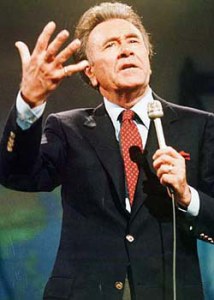Oral Roberts, Prosperity and the Perversion of Scripture

December 19, 2009

Oral Roberts died this week. He was 91 years old. Roberts was a bit of a denominational mish-mash. He was a Pentecostal faith healer, a United Methodist, a university president, and a proponent of the prosperity "gospel." I know it is normal practice to say nice things about a man when he dies. However, because of Oral Roberts' position as an influential teacher in the church and the errors he promoted I can only grieve when I think of the stricter judgement faced by all those who teach.
John MacArthur has written a worthwhile piece briefly tracing the emergence of word/faith and prosperity teaching and Oral Roberts' role as a popularizer of those false doctrines.
John MacArthur has written a worthwhile piece briefly tracing the emergence of word/faith and prosperity teaching and Oral Roberts' role as a popularizer of those false doctrines.
Oral Roberts died this week and the obituaries have been abuzz with analyses of his life and legacy. The USA Today headline summed up his contributions this way: "Oral Roberts brought health-and-wealth Gospel mainstream." The Los Angeles Times gave a similar snapshot of the man: "Oral Roberts dies at 91; televangelist was pioneering preacher of the 'prosperity gospel'"Read MacArthur's entire article HERE.
But Christianity Today's lead blogger, Ted Olsen, disagreed. He responded with a post titled "Why the Oral Roberts Obituaries Are Wrong." The long subtitle at the head of Olsen's post explained: "The 'faith-healer' (who hated the term) may have done much to mainstream Pentecostalism, but he was no architect of the Prosperity Gospel."
Olsen's argument, essentially, is that the real founder and mastermind of prosperity doctrine was not Oral Roberts but Kenneth Hagin, "who is far more widely recognized as the man who joined Pentecostalism with the Faith Movement (also called 'Word-Faith,' or derogatively, the Prosperity Gospel or 'Health and Wealth' gospel)."
Olsen, however, is wrong. He has evidently confused two categories. It is quite true that Kenneth Hagin is the main prosperity preacher who popularized word-faith doctrine--the notion that the words we speak determine the blessings we receive. Hagin borrowed that doctrine from an earlier, lesser-known preacher--E. W. Kenyon. (A mountain of evidence suggests that Hagin actually plagiarized large portions of his published works from Kenyon's writings.) Kenyon had been strongly influenced by the teachings of New Thought, a 19th-century metaphysical cult similar to Christian Science. So Hagin's word-faith doctrines had deeply cultic roots, but the idea fit perfectly with the prosperity doctrines that were already being taught by A. A. Allen, Oral Roberts, Jack Coe, and other faith-healers. The two ideas were natural complements to one another.
Still, word-faith doctrine and the prosperity gospel are not synonymous. (Even the current Wikipedia entry acknowledges this: "Although [the Word of Faith movement] shares teachings in common with Prosperity theology, they are not the same thing.") Prosperity doctrine is the notion that God's favor is expressed mainly through physical health and material prosperity, and that these blessings are available for the claiming by anyone who has sufficient faith.
Oral Roberts was certainly the 20th century's leading advocate of that idea. His prosperity doctrine laid the foundation for an enormous media-based religious system, and Oral Roberts was indeed its chief architect. It is preposterous that Christianity Today would try to whitewash that fact. Prosperity teaching was what Roberts himself wanted to be remembered for.
Also, check out this article from the Trinity Foundation.




